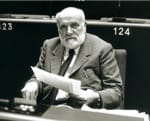Altiero Spinelli was born in Rome in 1907.
A convinced anti-fascist, he was arrested in 1927 and placed under house arrest. It was during this period that he co-wrote the Federalist Manifesto with Ernesto Rossi on the island of Ventotene, advocating for a free and united Europe. This text was clandestinely circulated within the Italian Resistance and proposed federalism as a solution to establish lasting peace among nations because, by overcoming the situations of permanent competition and the inevitable power struggles between nation-states responsible for wars, federalism carries social progress and pacification.
Hoping for the victory of the Allies, Spinelli and Rossi anticipated and advocated for the creation of a United Europe: “future United States of Europe which would be the most grandiose and innovative creation set up in Europe for centuries.”
“The path is not easy or safe, but it must be travelled, and it will be done.” In 1943, when Mussolini lost power, Spinelli was freed. He founded the European Federalist Movement and remained its secretary-general until 1962. He was also a delegate of the European Federalist Union and founder of the Institute of International Affairs in Rome.
Meanwhile, he became the political advisor to Piero Nenni, President of the Italian Socialist Party who was elected several times as Prime Minister. On several occasions, during his participation in congresses (Montreux in ’47, The Hague in ’48, Turin in ’57) he questioned the legitimacy of the nation-state. As a federalist, he wished for Europe to be possible by the states renouncing a part of their sovereignty, especially in terms of defense. Spinelli was fully committed to the project of the European Defense Community, but France refused to ratify the treaty in 1954.
Spinelli also campaigned for a Constitution on a European scale that would set the responsibilities of States and the terms of a new union between them. He hoped that the populations would participate electorally in this constitution.
“What our states, our governments, our parliaments must be called upon to accomplish is what I have called an abdication… In precise legal terms, our states must be invited to conclude among themselves a treaty—their last treaty—establishing a European electoral law, the date of the elections of a European Constituent Assembly, and the mandate given to it to define in a constitution the bodies to which will be transferred the power to legislate, govern, and rule on economic, social, military, and diplomatic matters… This same Treaty will recognize that each nation will decide directly, by popular referendum, its adherence to the Federation. This is how each of us will be called as a citizen of his national people to decide on the participation of his nation in the new community.” (European People’s Congress in Turin, 1957)
In 1970, he became a European commissioner in charge of research and industrial policy sectors.
In 1976, he was elected as a Member of the European Parliament. He then founded the Crocodile Club, named after a restaurant in Strasbourg, with seven other deputies. At their initiative, the European Parliament studied the institutional reform of the Community. On February 14, 1984, the project of the European Union was adopted by Parliament by a large majority (237 votes against 51).
The Parliament emerged strengthened and endowed with new legislative and budgetary powers.
Altiero Spinelli died in May 1986 in Rome.


